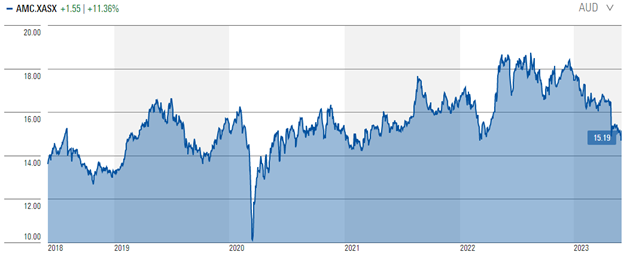Security Alert: Scam Text Messages
We’re aware that some nabtrade clients have received text messages claiming to be from [nabtrade securities], asking them to click a link to remove restrictions on their nabtrade account. Please be aware this is likely a scam. Do not click on any links in these messages. nabtrade will never ask you to click on a link via a text message to verify or unlock your account.
An opportunity for an ASX blue chip favourite
Joshua Peach | Morningstar Australia
Shares in large-cap Amcor (AMC) recently dipped into discount territory for the first time in three years, meaning the ASX 50 company may appeal to investors seeking to pick up a blue-chip stock without paying a premium.
Early last month, shares in the world’s largest consumer packaging manufacturer sank more than 9%, after the company downgraded its full-year profit forecast by around 5% in its third quarter report.
The company, which is best known for manufacturing bottles and food wrappers for well-known consumer staples, attributed to the guidance downgrade to a decline in volume, as demand weakens in the US and Europe and clients look to ‘de-stock’ their inventories.
The selloff means Amcor shares are now trading in 4-star territory - meaning undervalued - for the first time since May 2020.
Over the past three years, shares in the company have screened as either, 2-star (‘overvalued’) or 3-star (‘fairly valued’) based on Morningstar’s assessed fair value price.
The last time the company traded in 4-star territory, Amcor shares made Morningstar’s best stock ideas list for April 2020. At the time, Morningstar analysts noted Amcor’s strong balance sheet and defensive consumer staples-related business segment as drawcards for the stock.
Amcor's disappointing earnings result caused Morningstar to lower its fair value estimate (FVE) from $17.00 per share to $16.00, citing a reduced near-term outlook.
However, the 6% decrease in Amcor’s FVE was outstripped by the decline in the share price, pushing the stock further into undervaluation and triggering the star-rating change.

Source: Morningstar
Long-term outlook balances near-term woes
Morningstar analyst Trevor Huynh says the results were materially weaker than expected, driven down by weakening consumer demand which adversely affected volumes.
“Despite the defensive nature of Amcor's end-market exposures of consumer staples, healthcare, personal care, and beverages, the company is not immune to a slowdown in consumer demand and higher interest rates,” he says.
In the near-term, Amcor’s management expect the third-quarter volume weakness to accelerate into the fourth quarter. This could combine with high raw material costs to place further pressure on margins, according to Huynh.
Morningstar’s longer-term view of the stock, however, appears more promising.
“While short-term volumes are disappointing, longer-term, we are more constructive over Amcor's volumes and forecast improvement once customer destocking and consumer trading down completes,” Huynh says.
“From there, we expect Amcor to incrementally improve returns on invested capital over time.
“This reflects forecast strong single-digit organic sales growth through the reinvestment of free cash flows into emerging markets and higher-margin differentiated products.”
While the company missed market expectations most recently, Huynh says the Amcor remains a “consistent performer” which facilitates the compounding of value over time.
“Amcor remains a consistent earner generating earnings and cash flow from a defensive exposure to consumer staples and healthcare,” he says.
That consistency is further underpinned by the company’s scale, which Huynh says gives its advantages over its peers.
“We believe Amcor's cost advantage is driven primarily through procurement, that is buying in bulk and on better terms, and fractionating fixed costs on large volumes allowing Amcor to aggressively drive down unit product costs and maximise profitability in the highly commoditised packaging products sector,” he says.
These cost-advantages underpin Morningstar’s narrow-moat ranking for the stock. Companies granted a narrow-moat rating have competitive advantages that are considered strong enough to fend off competition and earn high returns on capital for more than 10 years.
First published on the Firstlinks Newsletter. A free subscription for nabtrade clients is available here.
Joshua Peach is a reporter for Morningstar Australia. Analysis as at 5 June 2023. This information has been provided by Firstlinks, a publication of Morningstar Australasia (ABN: 95 090 665 544, AFSL 240892), for WealthHub Securities Ltd ABN 83 089 718 249 AFSL No. 230704 (WealthHub Securities, we), a Market Participant under the ASIC Market Integrity Rules and a wholly owned subsidiary of National Australia Bank Limited ABN 12 004 044 937 AFSL 230686 (NAB). Whilst all reasonable care has been taken by WealthHub Securities in reviewing this material, this content does not represent the view or opinions of WealthHub Securities. Any statements as to past performance do not represent future performance. Any advice contained in the Information has been prepared by WealthHub Securities without taking into account your objectives, financial situation or needs. Before acting on any such advice, we recommend that you consider whether it is appropriate for your circumstances.
